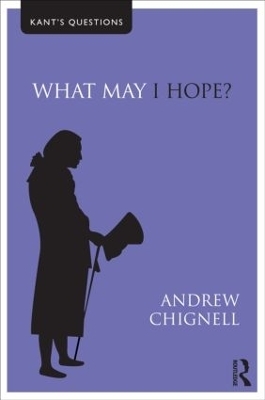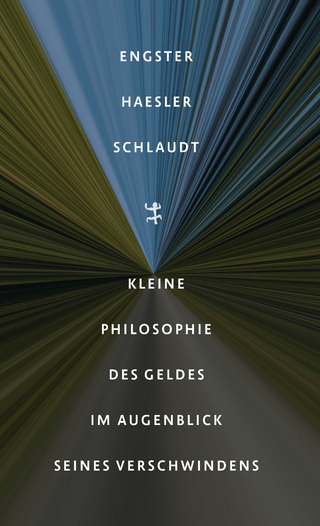
What May I Hope?
Seiten
2026
Routledge (Verlag)
978-0-415-49593-6 (ISBN)
Routledge (Verlag)
978-0-415-49593-6 (ISBN)
- Noch nicht erschienen (ca. Juni 2026)
- Versandkostenfrei innerhalb Deutschlands
- Auch auf Rechnung
- Verfügbarkeit in der Filiale vor Ort prüfen
- Artikel merken
What May I Hope? introduces and assesses one of Kant’s most interesting yet often overlooked questions: what does Kant mean by hope and why did he see it as a fundamental philosophical question?
The concept of hope plays a fascinating yet overlooked role in Kant's thought. Whilst his emphasis on reason and enlightened thought may be seen to leave little room for hope, it is a question that sits at the heart of his writings on religion and political philosophy. What May I Hope? introduces and assesses Kant's answers to this compelling question and also places hope in a contemporary philosophical context.
Andrew Chignell begins by introducing accounts of hope before Kant, including those of Plato, Aristotle, St. Paul, Augustine and Aquinas. He then explains how Kant’s metaphysics provides the background to his account of hope before examining the relationship between belief and hope, in particular Kant’s argument that it is rational for human beings to hope not only that God exists but that we legitimately hope for political ends such as the ideal republic, the ‘kingdom of ends’ and peace. He also shows how hope motivates a theme at the centre of Kant’s work as a whole: that we progress towards enlightenment and autonomy.
He then considers early criticisms of Kant’s theory of belief and faith in the work of Jacobi, Fichte, Schelling and Feuerbach before considering the two most important critics of Kant’s philosophy of hope, Hegel and Marx. He also examines the criticisms levelled against Kant by Kierkegaard, for whom faith is much more important than hope, and Schopenhauer, who in contrast promotes a philosophical hopelessness before considering pragmatists such as John Dewey and Richard Rorty who accorded an important place to hope.
The final part of the book asks what we may hope for today. Chignell asks what place hope has in the face of inequality, human suffering and genocide and asks whether religion may promote false hope, leading us away from political action.
The concept of hope plays a fascinating yet overlooked role in Kant's thought. Whilst his emphasis on reason and enlightened thought may be seen to leave little room for hope, it is a question that sits at the heart of his writings on religion and political philosophy. What May I Hope? introduces and assesses Kant's answers to this compelling question and also places hope in a contemporary philosophical context.
Andrew Chignell begins by introducing accounts of hope before Kant, including those of Plato, Aristotle, St. Paul, Augustine and Aquinas. He then explains how Kant’s metaphysics provides the background to his account of hope before examining the relationship between belief and hope, in particular Kant’s argument that it is rational for human beings to hope not only that God exists but that we legitimately hope for political ends such as the ideal republic, the ‘kingdom of ends’ and peace. He also shows how hope motivates a theme at the centre of Kant’s work as a whole: that we progress towards enlightenment and autonomy.
He then considers early criticisms of Kant’s theory of belief and faith in the work of Jacobi, Fichte, Schelling and Feuerbach before considering the two most important critics of Kant’s philosophy of hope, Hegel and Marx. He also examines the criticisms levelled against Kant by Kierkegaard, for whom faith is much more important than hope, and Schopenhauer, who in contrast promotes a philosophical hopelessness before considering pragmatists such as John Dewey and Richard Rorty who accorded an important place to hope.
The final part of the book asks what we may hope for today. Chignell asks what place hope has in the face of inequality, human suffering and genocide and asks whether religion may promote false hope, leading us away from political action.
Introduction Part 1: Kant’s Answers to the Question 1. Hope before Kant 2. Pre-critical Hope 3. Transcendental Ideas and the Critique of Metaphysics 4. Belief, Faith, and Hope 5. Immortality and Social Progress Part 2: The Fate of Hope 6. Between Kant and Hegel 7. Hegel’s Hope and Marx’s Progress 8. Kierkegaard and Schopenhauer 9. Pragmatism Part 3: What may we hope for today? Index
| Erscheint lt. Verlag | 1.6.2026 |
|---|---|
| Reihe/Serie | Kant's Questions |
| Verlagsort | London |
| Sprache | englisch |
| Maße | 156 x 234 mm |
| Themenwelt | Geisteswissenschaften ► Philosophie ► Metaphysik / Ontologie |
| Geisteswissenschaften ► Philosophie ► Philosophie der Neuzeit | |
| Geisteswissenschaften ► Religion / Theologie | |
| ISBN-10 | 0-415-49593-8 / 0415495938 |
| ISBN-13 | 978-0-415-49593-6 / 9780415495936 |
| Zustand | Neuware |
| Haben Sie eine Frage zum Produkt? |
Mehr entdecken
aus dem Bereich
aus dem Bereich
Buch | Hardcover (2024)
Matthes & Seitz (Verlag)
28,00 €


